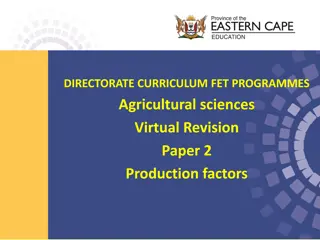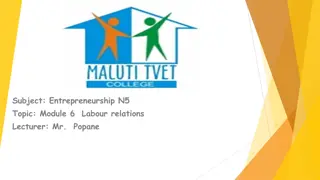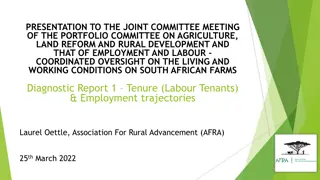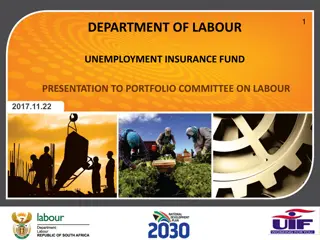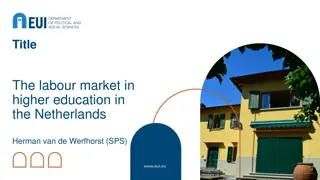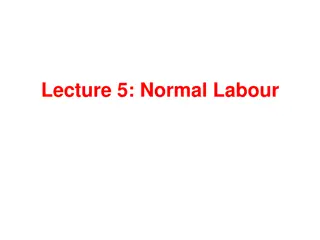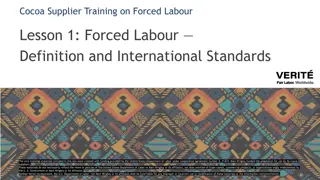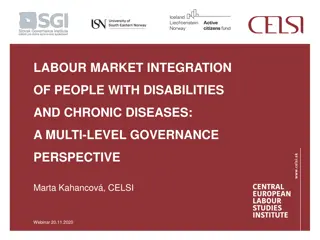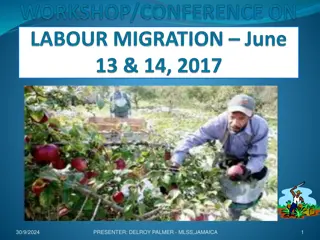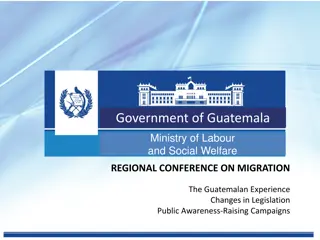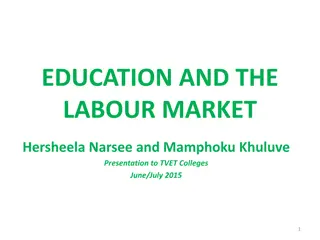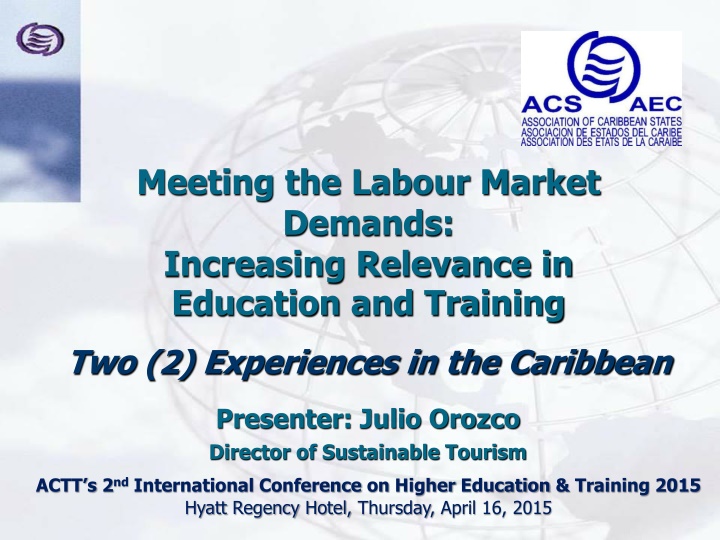
Meeting the Labour Market Demands: Increasing Relevance in Education and Training
Experiences in addressing labour market demands through education and training in the Caribbean region. Learn about initiatives, programs, and studies aimed at enhancing skills development and vocational training to meet emerging trends in various industries, with a focus on sustainable tourism.
Download Presentation

Please find below an Image/Link to download the presentation.
The content on the website is provided AS IS for your information and personal use only. It may not be sold, licensed, or shared on other websites without obtaining consent from the author. If you encounter any issues during the download, it is possible that the publisher has removed the file from their server.
You are allowed to download the files provided on this website for personal or commercial use, subject to the condition that they are used lawfully. All files are the property of their respective owners.
The content on the website is provided AS IS for your information and personal use only. It may not be sold, licensed, or shared on other websites without obtaining consent from the author.
E N D
Presentation Transcript
Meeting the Labour Market Demands: Increasing Relevance in Education and Training Two (2) Experiences in the Caribbean Presenter: Julio Orozco Director of Sustainable Tourism ACTT s 2ndInternational Conference on Higher Education & Training 2015 Hyatt Regency Hotel, Thursday, April 16, 2015
The Association of Caribbean States Established in 1994 to promote consultation, cooperation and concerted action in the Greater Caribbean. (25 Member States and 7 Associate Members).
Programmatic Areas of the Directorate of Sustainable Tourism Promotion of Languages and Cultures of the Greater Caribbean 1. Promotion of Multi-Destination Tourism 2. Tourist Safety and Security 3. Sustainable Tourism Zone of the Greater Caribbean (STZC) 4. Additionally, the ACS works for Knowledge Enhancement of Vulnerable Groups, including SMEs and Women, Youth & Children livelihoods for Rural, Ethnic and Indigenous Communities
Two (2) Experiences in the Greater Caribbean 1. Occupational Demands Anticipating Skills Requirements: and Emerging Trends 2. A study on Technical and Vocational Education and Training (TVET) in Tourism in the Greater Caribbean
1. Anticipating Skills Requirements: Occupational Trends and Emerging Demands in Tourism
Two workshops developed by ILO/CINTERFOR, held in Trinidad and Tobago in order to train participants from 8 countries (May and December 2014) The participants were representatives of TVET institutions in the eight (8) countries
Objective: to establish a set of sectorial recommendations for skills development and vocational training based after the identifications of technological diffusion trends The participants were trained in the use of the following tools: 1. Delphi questionnaire 2. Specialists board Occupational Impacts and Recommendations
2. A study on Technical and Vocational Education Training (TVET) in Tourism in the Greater Caribbean and
Based on the aforementioned areas addressed by this field, the ACS initiated a study entitled Training for Careers in Sustainable Tourism, with a focus on Technical and Vocational Education and Training.
BACKGROUND OF PROJECT Skill level, competency and professionalism of tourism indistry s workforce determine the competitiveness of the Caribbean brand The lack of skilled workers in the industry has been cited as a disadvantage in CTO and SITCA reports As a result, all tourism operators now provide cross training for employees to develop multiple skills
BACKGROUND OF PROJECT This study is an undertaking of the ACS in collaboration with the French Development Agency (AFD) and is designed as a proactive approach to produce documentation and provide recommendations for strategies and procedures to strengthen human resource capacities in areas necessary for a sustainable and competitive Tourism Industry in the Greater Caribbean.
The overall objective of the studyis the acquisition of data and research reflecting the needs and priorities for Professional Training in the Tourism Sector for the development of comprehensive TVET and capacity-building programme.
Scope of work Based on the four (4) Programmatic Areas of the DST s Sustainable Tourism Work Programme, the project s main activities consist of the following: Assessment of Technical and Vocational Training Initiatives Programmes and Institutions in the Tourism and Hospitality Sectors Data collection and activities, indicative of status of programmes and needs to be addressed
Specific objectives Identify the needs for training and HR Development in the Tourism Sector Determine gaps and challenges regarding TVET and capacity-building Provide recommendations to address needs, challenges and priorities Develop a Directory of Tourism and Hospitality Training Institutions and related courses offered in the Greater Caribbean Develop a Framework for Implementation of a Programme to deliver Training and Capacity-building programme to enhance HR competencies Improve proficiency of the Tourism Product with regard to priority areas of the ACS
Methodology in Data Collection Research methodology is based on available data on TVET stakeholders from direct contact with education and work government officials and TVET related experts in the field. A survey and interviews directed to education and training providers was developed to: identify the TVET institutions and stakeholders determine the offers of education and training.
Key findings TVET can be considered an innovation in the Greater Caribbean HR as the key to performance in every economy Regional support for TVET in the tourism and hospitality industry has been weak compared to others industries TVET s biggest challenge is producing a skilled workforce to match the market s needs
Key findings The three (3) education sectors in the Greater Caribbean: 1. skills sector 2. vocational/technical sector 3. higher education sector Determining factors in ensuring TVET relevance to the Tourism and Hospitality Industry Best practices on developing TVET programmes/strategies for the tourism and hospitality industry will help Caribbean to evaluate TVET systems of their own
Key findings Four shared characteristics among TVET approaches in the Greater Caribbean: 1. Demand-driven design 2. Open Access 3. Portability of Skills 4. Continuous Improvement Most TVET programmes focus on basic vocational education but some countries offer continuing TVET education with the aim of upgrading skills UNESCO-UNEVOC assists Member States development of policies and Practices concerning education for the world of work and skills for employability and citizenship
Key findings Programmes include a diploma and short-course offerings as well as 1. production of teaching and learning materials 2. establishment of linkages with other educational institutions 3. enrolment of youth and adults No one approach or set of data can fully capture costs, benefits and financing of TVET Interpretation differences in the gradations of technical and vocational progression
A New Trend: Greening Technical and Vocational Educational and Training (GTVET) Recently, GTVET has been widely introduced to ensure TVET s role in promoting sustainability. As this approach corresponds to the programmatic areas in the ACS Sustainable Tourism Work Programme dealing with enhancement of SMEs, women, youth and indigenous communities, it is recommended that the GTVET model be adapted for use in the Greater Caribbean.
Current activities Continue obtaining input from training and education experts and institutions via surveys and personal and phone interviews Design and develop Tourism Training and Education Directory of the Greater Caribbean Consult with relevant tourism and hospitality industry representatives to obtain additional expert input regarding TVET needs and priorities Conduct comparative analysis on offer and demand as well as determine gaps, needs, challenges and priorities Review current education approach in the Greater Caribbean to obtain TVET best practices
Expected Outcomes Undertake analysis to create recommendations for developing national occupational skills standards (NOSS) that meet industry requirements Provide recommendations to the Greater Caribbean TVET stakeholders to address gaps, needs, challenges and priorities Propose a regional TVET framework for the tourism and hospitality industry Develop a proposal for an ILO competency-based curriculum for the tourism and hospitality industry
Thank you for your attention Contact information: jorozco@acs-aec.org

